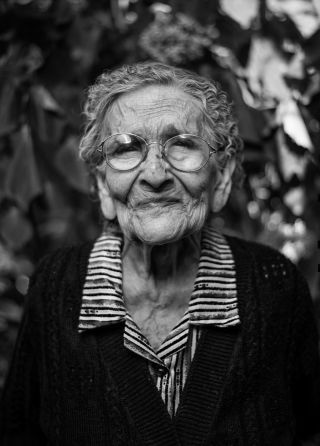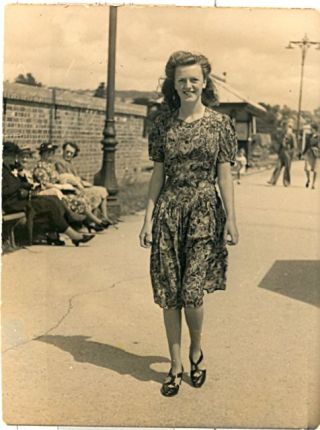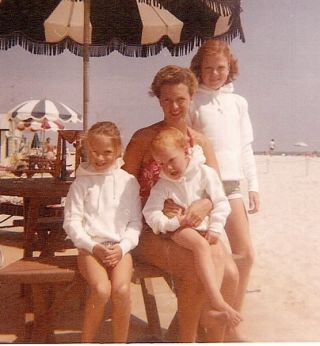Burnout
The Inherent Challenge of Caring for the Elderly
A Personal Perspective: Easing burnout in elderly care.
Updated August 2, 2023 Reviewed by Monica Vilhauer

Care of the elderly, particularly those with dementia, proves a challenge for many of us. Our empathy, our enthusiasm, our heroic zeal, often seems to lag. In fact, our response often extends beyond ambivalence to irritation, doesn’t it? But Why?
Why Is Caring for the Elderly So Draining?
Is it because of burnout? Is it the lack of promise of any forward progress? Is it their inability to connect with us? Are they beings too foreign to our perception of health, vitality, and worth? Or, perhaps, do they force us to peer a little too deeply into our own futures?
I decided to explore the phenomenon, so I singled out one of the many and studied her in depth (stories and photos care of her family).
Joy R.

Joy R. was born in Edinburg, Scotland in the far removed 1920’s. She moved in her pre-adolescence to a small seaside town in England, where her parents ran an inn. Her room upstairs was said to be haunted, so she learned to put up with middle of the night shifting of furniture and the repeated slamming of her door and windows. When the Second World War came, she dropped out of high school and took on a host of jobs. Fire Spotter. Nurse Assistant. Canteen Attendant. USO Dancer. She was there to help receive the wounded and the shell-shocked from Dunkirk. She even helped locate unexploded bombs.
At a séance she was told she had a “guardian angel” watching over her. Perhaps it was so. At a movie theatre, when air raid sirens sounded, she heard a voice tell her to get out. She did and shortly thereafter, the theatre took a direct hit. And some providence saved her when she ran out from underneath the town’s amusement pier to chase down her terrified dog as a Messerschmitt strafed the beach. No such providence was in order for her fiancée, a British commando, who met his maker in the skies over the Mediterranean.

At the end of the war, she met an U.S. naval officer, married him, and eventually emigrated to the states. She was widely recognized there as “that beautiful, brilliant, British war bride.” She was even stalked by a Broadway star. In her new country, she raised three children, essentially as a single mother, bathing them in love, surrounding them with books, and filling them with an obsession for learning.
It helped that she was sharp as a tack—a walking dictionary and thesaurus, and a fountain of general knowledge, literature, and world history. Too sharp, in fact, for the local bridge circuit who sought to handicap or ban her. Too good at quiz shows for her family to watch with her. Better read than any around her, she could rip through the most erudite of cryptic crossword puzzles in minutes.
Assaulted by multiple sclerosis and then breast cancer, she never slowed down, working in a doctor’s office, volunteering at the local hospital, running an ersatz animal hospital out of her kitchen, and playing the horses. She loved the races and made it to them two or three times a year. And somehow, she would always return home with hundreds of dollars in winnings—which she summarily dispersed amongst her children.
In her seventies, her husband died suddenly and things began to unwind. Subtle at first, the memory lapses were ascribed to depression. But when she started wandering far from home, looking for the English seaside in the middle of rural Pennsylvania, the diagnosis crystalized.
Alzheimer's
With Alzheimer’s, the layers of intelligence and poise and refinement began to peel away. Eventually unmanageable in her children’s homes, she entered a “long term care facility.” There she ascended the floors, the highest being reserved for the worst cases—those who were agitated, even violent, fearing everyone including themselves. She fell often, banging up this and bruising that. Despite a DNR designation, she kept being dragged into the local E.R.
The E.R. team was routinely treated to a withered corpse of a being, eyes wide and wild; terrified; screeching, clawing, biting; disheveled and “unkempt” (a word we practitioners love for some reason and tend to use pejoratively); thinning hair coming out in clumps; skin paper thin, torn, black and blue; smelling of urine and lack of hygiene; a being unrecognizable as her former self. Her former beautiful, dignified, brilliant, vivacious self. She went on to succumb to a hematoma crushing her brain.
If you haven’t yet surmised, the woman, Joy Olive Alexa Rydel, was my mother. And, in my book, she was a most remarkable being. But in the end, age and dementia had robbed her of all that she was. And it was near impossible, even for her family, to envision the amazing life force that she once had been.

Celebrating a Life Well Lived
We all lead unique and special lives. And if we’re lucky, we’ll make it to old age. And some of us will undergo a similar progression. Wouldn’t it be nice if those who tended to us focused on the people we were for most of our existences, rather than on what we had become?
Wouldn’t it be nice if they took a moment now and then to enjoy interacting with what was left of us (rather than focusing on what was lost); if they found and tickled our residual senses of humor, reminisced with us in our memories (no matter how inaccurate or confabulated), fostered within us a fading interest, and celebrated with us highlights of our wonderful lives (rather than be affronted by our messy ends)?
Wouldn’t such an approach afford us some much needed dignity and joy? And wouldn’t those around us find more wonder and meaning in their toils, bolstering their resilience, lessening their burnout?
References
Plockova, J. (2023) As Cases Soar, ‘Dementia Villages’ Look Like the Future of Home Care. New York Times. July 3, 2023
Harrad R, Sulla F. (2018) Factors Associated With and Impact of Burnout in Nursing and Residential Home Care Workers For the Elderly. Acta Biomed. 2018 Dec 7;89(7-S):60-69. doi: 10.23750/abm.v89i7-S.7830.PMID: 30539935
Otto A, Gutsch C, Bischoff L, Wollesen B. (2021) Interventions to Promote Physical and Mental Health of Nurses in Elderly Care: a Systematic Review. Prev Med. 2021 Jul;148:106591. doi: 10.1016/j.ypmed.2021.106591. Epub 2021 Apr 28.PMID: 33930430
Okamura,T., et al. (2018) A positive attitude towards provision of end-of-life care may protect against burnout: Burnout and religion in a super-aging society. PLoS One. 2018 Aug 9;13(8):e0202277. doi: 10.1371/journal.pone.0202277. eCollection 2018.PMID: 30092065
Nazir,A., et al. (2018) The Prevalence of Burnout Among Nursing Home Physicians: An International Perspective. J Am Med Dir Assoc. 2018 Jan;19(1):86-88. doi: 10.1016/j.jamda.2017.10.019.PMID: 29275938
Simonds,G., Sotile,W. (2019) Thriving in Healthcare: A Positive Approach to Reclaim Balance and Avoid Burnout in Your Busy Life. Huron Consulting Group, ISBN-10 : 1622181085
Simonds,G., Sotile,W. (2018) The Thriving Physician: How to Avoid Burnout by Choosing Resilience Throughout Your Medical Career. Huron Consulting Group, ISBN-10 1622181018




